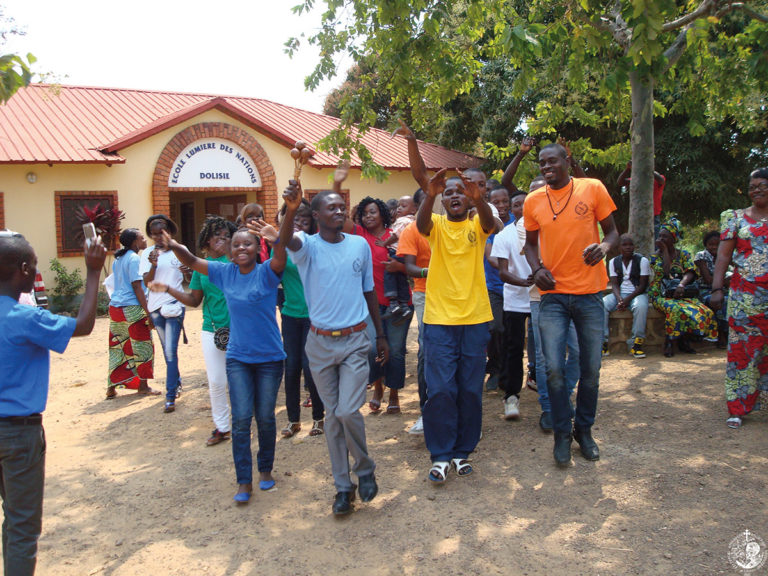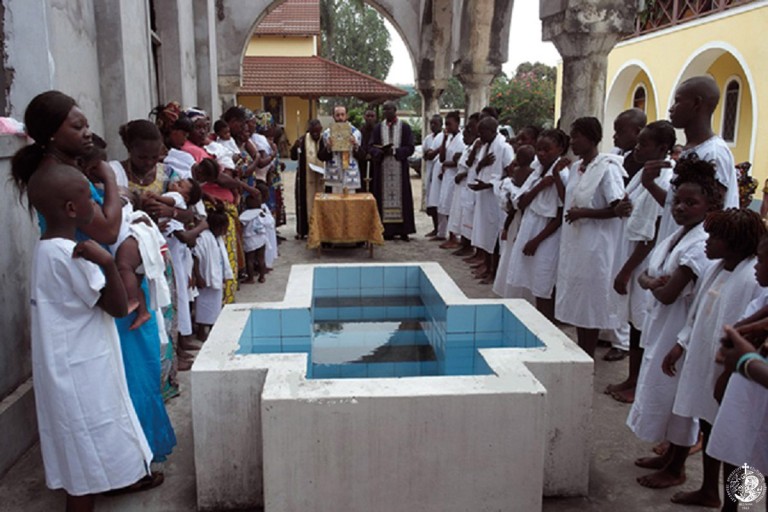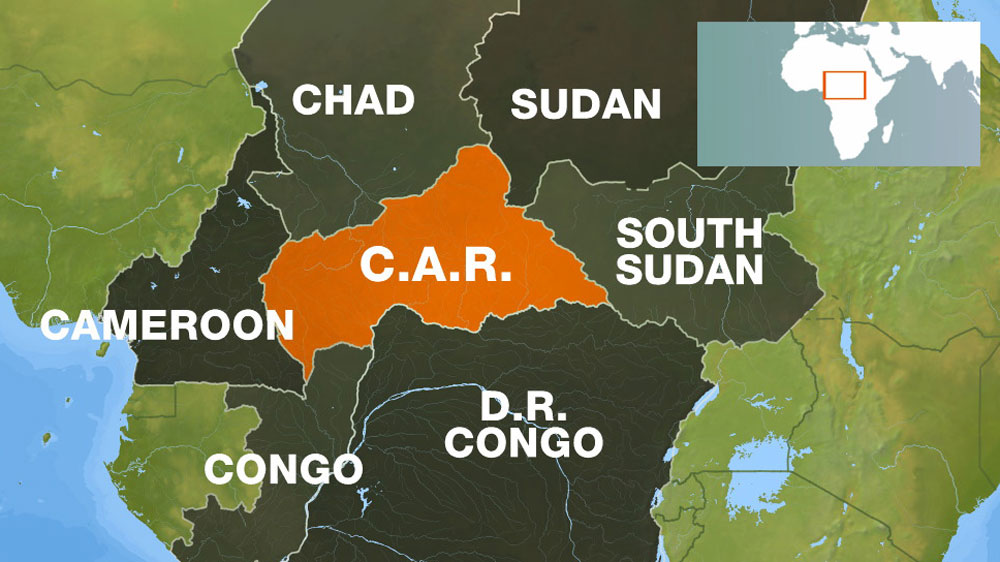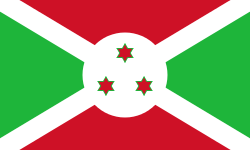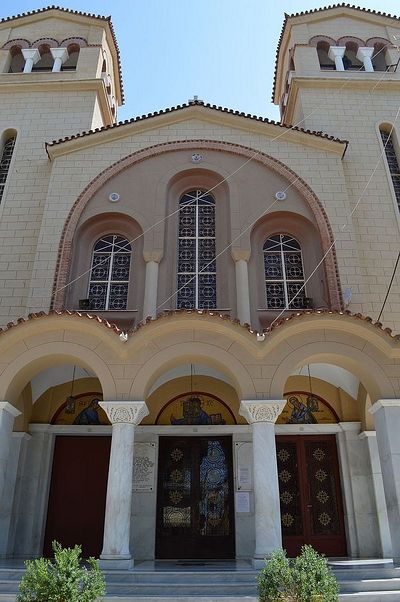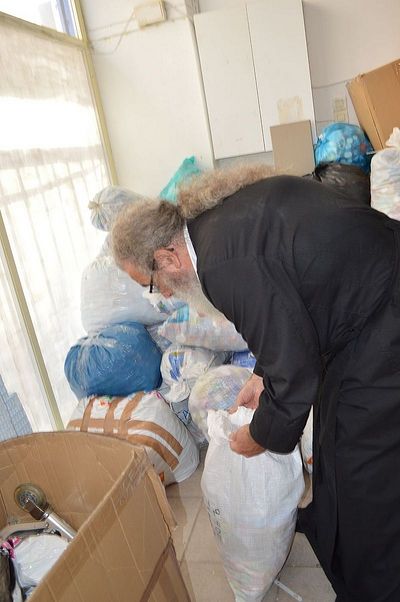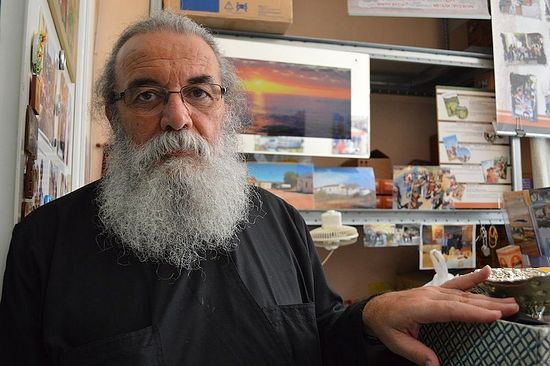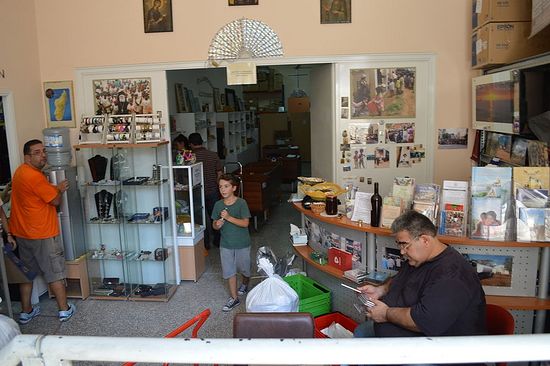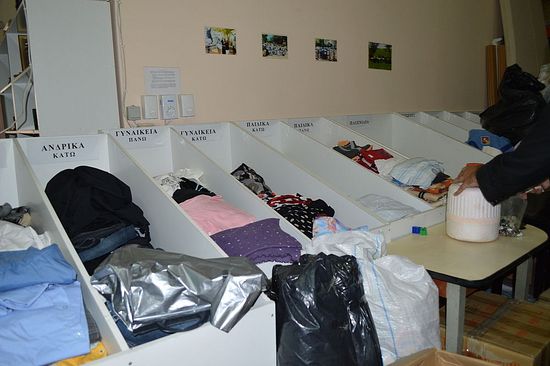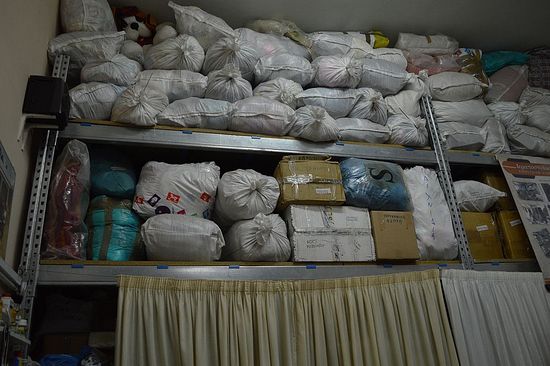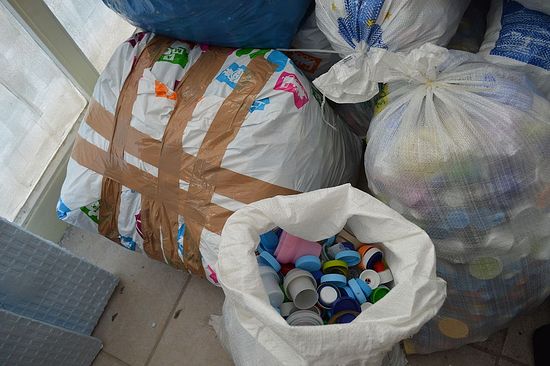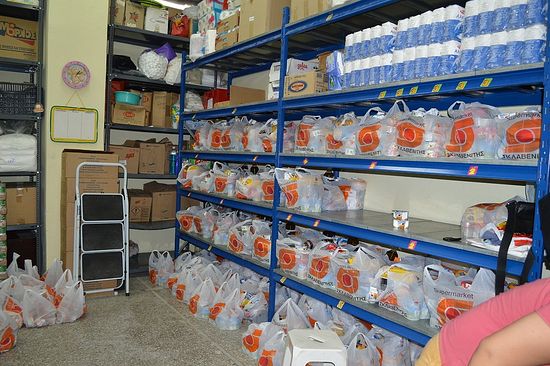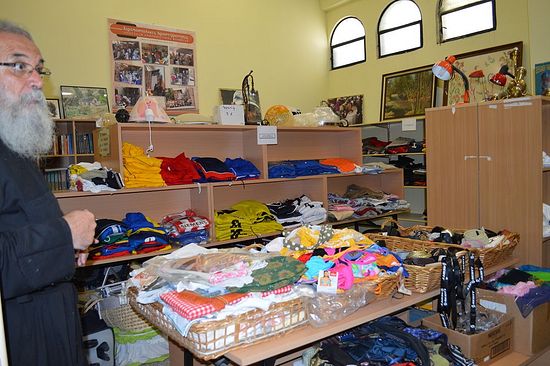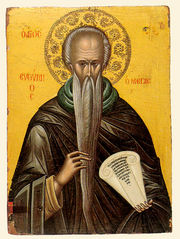Venerable Sisoes the Great
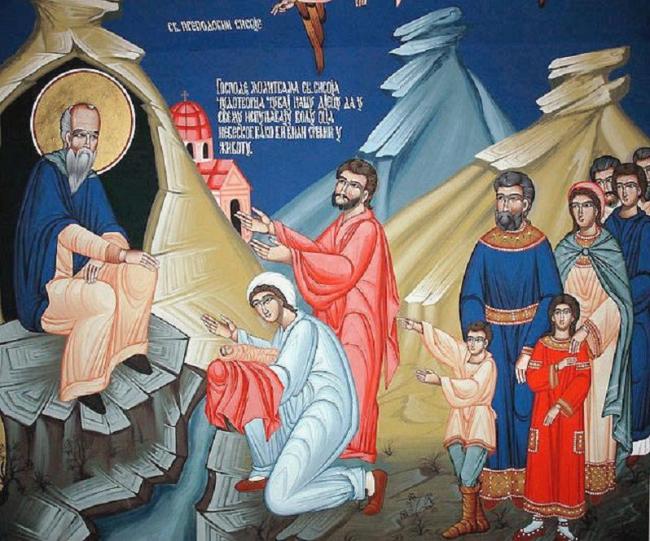
Bielin, Bosnia-Herzegovina. Orthodox Monastery of St Basil of Ostrozh, St Sisoes the Great (from here).
Saint Sisoes the Great (+ 429) was a solitary monk, pursuing asceticism in the Egyptian desert in a cave sanctified by the prayerful labors of his predecessor, St Anthony the Great (January 17). For his sixty years of labor in the desert, St Sisoes attained to sublime spiritual purity and he was granted the gift of wonderworking, so that by his prayers he once restored a dead child back to life.
Extremely strict with himself, Abba Sisoes was very merciful and compassionate to others, and he received everyone with love. To those who visited him, the saint first of all always taught humility. When one of the monks asked how he might attain to a constant remembrance of God, St Sisoes remarked, “That is no great thing, my son, but it is a great thing to regard yourself as inferior to everyone else. This leads to the acquisition of humility.” Asked by the monks whether one year is sufficient for repentance if a brother sins, Abba Sisoes said, “I trust in the mercy of God that if such a man repents with all his heart, then God will accept his repentance in three days.”
When St Sisoes lay upon his deathbed, the disciples surrounding the Elder saw that his face shone like the sun. They asked the dying man what he saw. Abba Sisoes replied that he saw St Anthony, the prophets, and the apostles. His face increased in brightness, and he spoke with someone. The monks asked, “With whom are you speaking, Father?” He said that angels had come for his soul, and he was entreating them to give him a little more time for repentance. The monks said, “You have no need for repentance, Father” St Sisoes said with great humility, “I do not think that I have even begun to repent.”
After these words the face of the holy abba shone so brightly that the brethren were not able to look upon him. St Sisoes told them that he saw the Lord Himself. Then there was a flash like lightning, and a fragrant odor, and Abba Sisoes departed to the Heavenly Kingdom.
Saint Sisoes the Great as a Model for our Lives
 |
| St. Sisoes the Great (Feast Day - July 6) |
By Protopresbyter Fr. George Papavarnavas
Saint Sisoes lived in the fourth
century and came from Thebes, Egypt. He belonged to the first generation
of great ascetics and was a disciple of Anthony the Great. Shining with
spiritual wisdom, humility and brotherly love, he was interested in
returning to the fold of Christ even one sinner. For the righteous and
unrighteous, rich and poor, rulers and subjects, clergy and laity, and
generally for the whole world, he would pray continuously. He showed
himself to be a heavenly man and an earthly angel. When Christ came to
collect his soul at the moment of his departure, He called him a "vessel
of the desert".
"They would say of the venerable
Sisoes that, when he was at the end of his long life of labors, as the
fathers were gathered about him, his face began to shine as the sun, and
he said, 'Behold, Abba Anthony is come;' then, 'Behold, the choir of
the Prophets is come;' his face shone yet more bright, and he said,
'Behold, the choir of the Apostles is come.' The light of his
countenance increased, and he seemed to be talking with someone. The
fathers asked him of this; in his humility, he said he was asking the
Angels for time to repent. The fathers told him, 'You have no need of
repentance, Abba.' Abba Sisoes responded, 'I tell you the truth, I have
not even made a beginning of it.' Thus they learned he was perfect.
Again his face became as bright as the sun, so that the fathers were
filled with fear. He said, 'Behold, the Lord is come, and He says,
"Bring Me the vessel of the desert,"' and as he gave up his soul into
the hands of God, there was as it were a flash of lightning, and the
whole dwelling was filled with a sweet fragrance."
His
departure was as glorious, as his humility was deep, and his life was
magnificent. Besides, his entire earthly life was a philosophy of death.
Tradition has preserved in iconography the visit of the Saint to the
tomb of Alexander of the Great. "There he deeply realized the vanity of
human glory and royal power and mourned for death, the common fate of
humanity. Then he philosophized about death and life, the temporary and
eternal."
Below we will quote part of his
divinely inspired teachings, which is just as valid today and is able to
build us up. They are answers to various requests made to him for
reasons of salvation or to solve certain problems that concerned them.
- One of the Fathers asked Abba
Sisoes, “If I am sitting in the desert and a barbarian comes to kill me
and if I am stronger than he, shall I kill?” The old man said to him,
“No, leave him to God. In fact, whatever the trial is which comes to a
man, let him say, ‘This has happened to me because of my sins,’ and if
something good comes, say, ‘It is through the grace of God.’”
- A brother asked Abba Sisoes,
"I have fallen, Abba; what shall I do?" The old man said to him, "Get up
again." The brother said, "I have gotten up again, but again have I
fallen." The old man said, "Get up again and again." So the brother
asked, "How many times?" The old man replied, "Until you are taken up
either in virtue or in sin. For a man presents himself to judgment in
that state in which he is found."
Many are hurt by the mistakes of
others to the point that they feel within them boiling the fury of
vengeance. They claim that they cannot forgive, because they feel hurt
or betrayed. Of course, the question is: "Is their love hurt and
betrayed or is it their ego?" For when someone truly loves it is
impossible for them to not forgive, for no misconduct can defeat love.
Therefore, the problem in human relations - in the family and in society
in general - is the lack of love, which prevents grace and forgiveness.
When one does not forgive, certainly they will suffer a fall in order
to be humbled and recover. Whoever believes in the Triune God and has
full confidence in His providence and love, takes no revenge on anyone,
but they pray and entrust everything to God.
- A brother whom another brother
had wronged came to see Abba Sisoes and said to him, "My brother has
hurt me and I want to avenge myself." The old man pleaded with him
saying, "No, my child, leave vengeance to God." He said to him, "I shall
not rest until I have avenged myself." The old man said, "Brother, let
us pray." Then the old man stood up and said, "God, we no longer need
you to care for us, since we do justice for ourselves." Hearing these
words, the brother fell at the old man’s feet, saying, "I will no longer
seek justice from my brother; forgive me Abba."
Certainly it is important for
one to have the continuous remembrance of God. Even more important,
though, is to have humility, which is the foundation of all virtues, and
the source of all good. Whoever is truly humble, considers himself
inferior not only to all people, but even to irrational creation.
- A brother said to Abba Sisoes,
"I am aware that the remembrance of God stays with me." The old man
said to him, "It is no great thing to be with God in your thoughts, but
it is a great thing to see yourself as inferior to all creatures. It is
this, coupled with hard work, that leads to humility."
One's state of being in this
temporary life sooner or later will become manifest. And it manifests
itself mainly during the time of a persons repose. The repose of the
saints is truly glorious, brilliant. It is a true celebration.
Source: Ekklesiastiki Paremvasi, "Ὅσιος Σισώης ὁ μέγας", June 2014. Translated by John Sanidopoulos.
The Icon of St. Sisoes the Great

Concerning the icon of St. Sisoes staring over the dead bones of Alexander the Great, we do not know for sure if this depicts a historical event. We do not have a historical account of what the icon describes until its depiction first starts appearing in monasteries in Greece following the Fall of Constantinople in 1453.
The inscription on the icon reads:
Sisoes, the great ascetic, before the tomb of Alexander, King of the Greeks, who was once covered in glory. Astonished, he mourns for the vicissitudes of time and the transience of glory, and tearfully declaims thus:
'The mere sight of you, tomb, dismays me and causes my heart to shed tears, as I contemplate the debt we, all men, owe. How can I possibly stand it? Oh, death! Who can evade you?'
The astonishment of Sisoes has been an icon of contemplation for all Christians, especially for monastics, since the 15th century and has spread so much in popularity that it appears throughout hundreds of Greek churches and monasteries. Among the most famous come from Holy Trinity Monastery and Varlaam Monastery at Meteora, and Hosios Loukas. The site of the church where this icon usually appears is on the opposite side of the altar area as people exit the church, where also the Dormition icon of the Theotokos also appears. It is wisely placed here so Christians can contemplate death as they leave the church.
It is no coincidence that this icon became so popular after the Fall of Constantinople. Constantinople, once the seat of the Roman Emperor from the time of Constantine the Great, always looked to Alexander as one of the most exemplary of rulers. In fact, this was a tradition of all the Roman Emperors. The historian Dion Cassius (155-235 AD) reports that after Augustus had visited the body of Alexander in Alexandria, he was asked if he also wanted to visit the tombs of the Ptolemies, the sovereigns of Hellenistic Egypt. He refused, saying: "I came to see a king and not dead men". Roman universal rule was considered an inheritance of the Roman Emperors received through Alexander.
It is not implausible that the depiction of Sisoes lamenting over the tomb of Alexander is a historical event lost to us in document form but survives only in iconography. In many ways, the iconographic tradition is just as reliable historically as is a written document. Since Sisoes was a contemporary of the time of the destruction of Alexander's tomb, I would find it difficult to believe that such a wise disciple of Anthony the Great living outside Alexandria would not at least make some comment in this regard.
Sisoes lamenting over Alexander is also a lament over an ideology. It is not by coincidence that both men are known by the epithet "Great". At one time, during Roman rule that lasted over a millennium and a half, Alexander was an icon of the Empire, but now that the Empire was gone the Romans looked to monastics as the only hope for suffering Orthodoxy under the Ottoman Muslims. It is this outlook which formed the Orthodox mentality during this period. That is not to say that it did not exist before, since this was always a part of christian and monastic tradition, but now Sisoes stands over Alexander's dead bones alive and learning the great lesson of the vanity of worldly glory. Roman glory may have vanished, but the Kingdom of Heaven reigns forever.
Read also: Sisoes the Great and the Contemplation of Death as a Means to True Life in Christ
Dweller of the desert and angel in the body, / you were shown to be a wonder-worker, our God-bearing Father Sisoes. / You received heavenly gifts through fasting, vigil, and prayer: / healing the sick and the souls of those drawn to you by faith. / Glory to Him who gave you strength! / Glory to Him who grant-ed you a crown! / Glory to Him who through you grants healing to all!
From your youth you followed the angelic life / And were therefore filled with many godly gifts. / O Sisoes, emulator of the angels, / In the hour of your going forth from this life, / You shone resplendently as the sun / Revealing your glory and illuminating our souls!
In asceticism you were revealed to be an earthly angel, / continually enlightening the thoughts of the faithful with divine signs. / Therefore we honor you with faith, venerable Sisoes.
Click
Umonaki katika Kanisa la Orthodox
Orthodox Monasticism
Theosis (deification): The True Purpose of Human Life
Orthodox Monasticism
Theosis (deification): The True Purpose of Human Life

